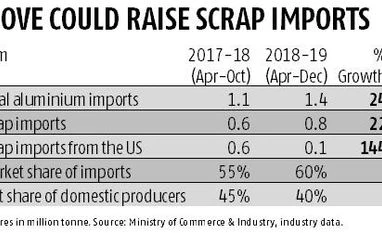Home / Markets / Commodities / Aluminium companies fear swell in scrap imports as China hardens norms
Aluminium companies fear swell in scrap imports as China hardens norms
In a latest step to protect its indigenous aluminium smelting industry, China has classified 'aluminium scrap' under its Restrictive Import list
)
premium
Last Updated : Jan 22 2019 | 1:07 AM IST
The primary aluminium producers in the country are piqued by China's measure to stiffen regulations on imports of aluminium scrap.
In a latest step to protect its indigenous aluminium smelting industry, China has classified 'aluminium scrap' under its Restrictive Import list. The new norm aimed at containing scrap imports will be effective from July 2019. Further, China aims to completely ban imports of scrap and waste by 2020.
Aluminium makers feel China's protectionist steps will accelerate scrap imports into India. Their fears are magnified since China is locked in a bitter trade conflict with US. After US clamped 10 per cent import duty on aluminium, the Asian giant retaliated with 25 per cent import duty on aluminium scrap sourced from US.
The plight of India's primary aluminium producers can be gauged from the spike in imports, especially scrap in the changed geopolitical equations. Between April and October, total aluminium imports by the country rose 24 per cent to 1.37 million tonnes with share of imports reaching 60 per cent in domestic consumption. The share of domestic producers, on the contrary, has dipped to 40 per cent.
Scrap imports in the period under review moved up 22 per cent. Imports of scrap from US alone zoomed 144 per cent.
“Aluminium imports in India are totally non-essential in nature as the country has ample domestic capacity. Containing aluminium imports could save $5 billion (or around Rs 35,500 crore) in forex outgo”, said an industry source.
In last fiscal, India imported 1.96 million tonnes of aluminium valued at $2 billion (or Rs 30,000 crore), representing one per cent of the country's total imports. Of the total aluminum import basket, scrap imports were valued at Rs 13,000 crore. In volume terms, scrap comprised 57 per cent of the overall aluminium imports. The three primary aluminium producers- National Aluminium Company (Nalco), Vedanta Ltd and Hindalco Industries combined, boast of a rated capacity of 4.1 million tonnes, bettering the domestic demand of 3.6 million tonnes in FY18.
Hurt by the spate of imports, the aluminium makers represented by Aluminium Association of India (AAI) has sought a four-fold hike in import duty of scraps from 2.5 per cent to 10 per cent. AAI has also suggested that the customs duty on primary aluminium be revised from 7.5 per cent to 10 per cent. This will overcome the inverted duty structure and help achieve parity in aluminium import levies in line with other non-ferrous metals like copper, zinc, lead, nickel and tin.
AAI's counterpart in secondary aluminium space- Aluminium Secondary Manufacturers Association (ASMA), however, sought to play down the outrage over swelling scrap imports.
“Import of aluminium scrap is nothing new and going on for ages, we are surprised as to why are we objecting on the import of a recyclable and environmental friendly substance. Scrap uses only five per cent of the energy needed to produce primary aluminium and produces much lesser green house gases. India imported 866,000 tonnes of scrap in 2014-15 which has increased to 1.11 million tonnes in 2017-18 – an increase of 29 per cent in three years is nothing alarming and justified for a fast growing economy like India. Scrap is mainly used for making alloy ingots mostly used by the auto industry and world over alloy ingots are made by using scrap only”, ASMA had said previously in an e-mail response.
Aside from the spurt in imports, softening LME (London Metal Exchange) prices and escalating input costs have kept the domestic manufacturers in a bind. Since May 2018, aluminium prices on LME have crashed 23 per cent, falling from $2290 to $1800 per tonne in January 2019. Moreover, input commodity inflation has led to sharp increase in aluminium production costs by 30 per cent in the past three to four years. Recurring increases in raw material costs and upward revisions in coal cess and electricity duty has dented the sustainability and competitiveness of the aluminium industry.